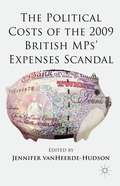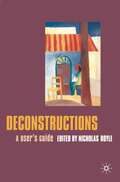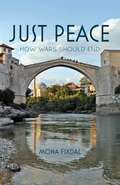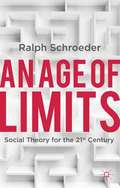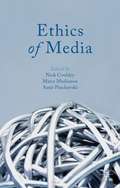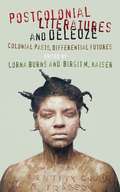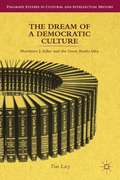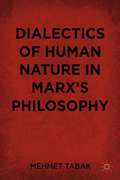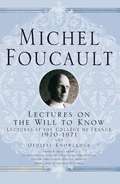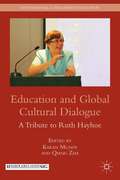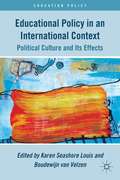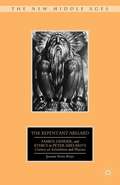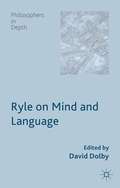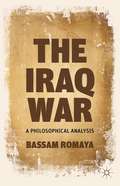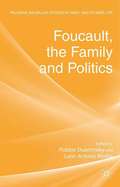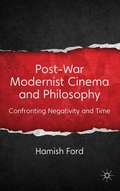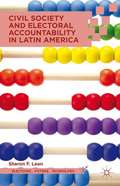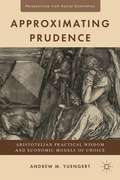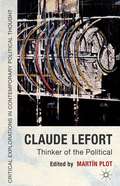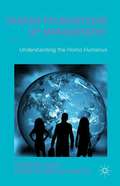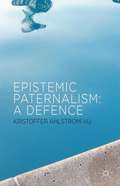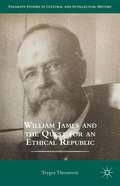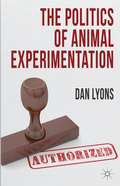- Table View
- List View
The Political Costs of the 2009 British MPs� Expenses Scandal: Doing Time, Doing Freedom (Palgrave Studies in Prisons and Penology)
by Jennifer Vanheerde-HudsonThis study examines the evolution and political consequences of the 2009 British MPs' expenses scandal. Despite claims of a revolution in British politics, we show how the expenses scandal had a limited, short-term impact.
Deconstructions
by Nicholas RoyleDeconstructions: A User's Guide is a new and unusual kind of book. At once a reference work and a series of inventive essays opening up new directions for deconstruction, it is intended as an authoritative and indispensable guide. With a helpful introduction and specially commissioned essays by leading figures in the field, Deconstructions offers lucid and compelling accounts of deconstruction in relation to a wide range of topics and discourses. Subjects range from the obvious (feminism, technology, postcolonialism) to the less so (drugs, film, weaving). Backed up by an unusually detailed index, this User's Guide demonstrates the innumerable and altering contexts in which deconstructive thinking and practice are at work, both within and beyond the academy, both within and beyond what is called 'the West'.
Just Peace
by Mona FixdalDrawing on many of the wars and peaces of recent decades, this book offers a persuasive new perspective on postwar justice. In her analysis wars of succession, wars for territory, and the political institutions that precede and follow wars, Fixdal explores the outer limits of the idea that it is worth paying almost any price for peace.
An Age of Limits: Social Theory for the 21st Century
by Ralph SchroederAn Age of Limits outlines a new social theory for understanding contemporary society. Providing an analysis of why political, economic and cultural powers face constraints across the global North and beyond, this bold book argues that forces which address current challenges must confront the limits of the interplay between dominant institutions.
Ethics of Media
by Nick Couldry Mirca Madianou Amit PinchevskiEthics of Media reopens the question of media ethics. Taking an exploratory rather than prescriptive approach, an esteemed collection of contributors tackle the diverse areas of moral questioning at work within various broadcasting practices, accommodating the plurality and complexity of present-day ethical challenges posed by the world of media.
Global Perspectives on Orhan Pamuk
by Mehnaz M. Afridi David M. BuyzeExplores existential and political themes in Orhan Pamuk's work and investigates the apparent contradictions in an arena where Islam and democracy are often seen as opposing and irreconcilable terms. Existential themes delve into literary nuances in Pamuk that discuss love, happiness, suffering, memory and death.
Postcolonial Literatures and Deleuze
by Lorna BurnsBringing together high profile scholars in the fields of Deleuze and postcolonial studies, this book highlights the overlooked connections between two major schools of contemporary criticism and establishes a new critical discourse for postcolonial literature and theory.
The Dream Of A Democratic Culture
by Tim LacyThis book presents a moderately revisionist history of the great books idea anchored in the following movements and struggles: fighting anti-intellectualism, advocating for the liberal arts, distributing cultural capital, and promoting a public philosophy, anchored in mid-century liberalism, that fostered a shared civic culture.
Dialectics of Human Nature in Marx�s Philosophy
by Mehmet TabakA scholarly exploration of Marx's thought without any favorable or critical ideological agendas, this book opposes the compartmentalization of Marx's thought into various competing doctrines, such as historical materialism, dialectical materialism, and different forms of economic determinism. It highlights Marx's humanism; however, instead of pitting Marx's humanism against materialism, dialectical and historical, this book demonstrates their unity in a novel way. The method employed is exegetical, with an emphasis on Marx's own dialectic method. This approach differentiates the present work from the currently popular interpretations, which (mis)interpret Marx through the prism of analytical philosophy.
Lectures on the Will to Know: Lectures at the College De France 1970–1971 and Oedipal Knowledge
by Daniel DefertLectures on the Will to Know reminds us that Michel Foucault's work only ever had one object: truth. Here, he builds on his earlier work, Discipline and Punish, to explore the relationship between tragedy, conflict, and truth-telling. He also explores the different forms of truth-telling, and their relation to power and the law. The publication of Lectures on the Will to Know marks a milestone in Foucault's reception, and it will no longer be possible to read him in the same way as before.
Education and Global Cultural Dialogue
by Qiang Zha Karen MundyCultural and spiritual resources are arguably essential to achievement of educational goals, both as economic and political initiatives and as human rights. This book addresses questions surrounding education and inter-cultural understanding in a broad global framework.
Educational Policy in an International Context
by Karen Seashore Louis Boudewijn Van VelzenProvides a provocative examination of the interplay between political culture and educational policy. The goal is to provide a better understanding of how different countries are responding to the global exchange of policy ideas that includes 'the standards movement' and 'new public management' or accountability in the public sector.
The Repentant Abelard
by Juanita Feros RuysThe Repentant Abelard is both an innovative study and English translation of the late poetic works of controversial medieval philosopher and logician Peter Abelard, written for his beloved wife Heloise and son Astralabe. This study brings to life long overlooked works of this great thinker with analyses and comprehensive notes.
Ryle on Mind and Language
by David DolbyThis collection is devoted to Gilbert Ryle's philosophy of mind and language. It features essays from prominent scholars on the topics of category mistakes, hypotheticals, dispositions, emotion, thinking, perception, and the task-achievement distinction.
The Iraq War
by Bassam RomayaThis book features a critique of key philosophical doctrines that dominate the Iraq war debate: just war theory, humanitarian intervention, democratic realism, and preventive war doctrine. The author evaluates each and develops a philosophical approach that offers a model for thinking through the philosophical dilemmas introduced by new wars.
Foucault, the Family and Politics
by Robbie Duschinsky Leon Antonio RochaDrawing on the writings of Foucault, this book explores the politics and power-dynamics of family life, examining how everyday obligations such as attending school, going to work and staying healthy are organized through the family. The book includes an essay by Foucault, Les désordres des familles , translated here in English for the first time.
Executive Politics in Times of Crisis
by Martin Lodge Kai WegrichExecutive Politics in Times of Crisis brings together leading international scholars to consider key trends and challenges that have defined executive politics over the past decade. It showcases key debates in executive politics and contributes to an understanding of the 'executive factor' in political life.
Post-War Modernist Cinema and Philosophy
by Hamish FordA unique study of four major post-war European films by four key 'auteurs', which argues that these films exemplify film modernism at the peak of its philosophical reflection and aesthetic experimentation.
Civil Society and Electoral Accountability in Latin America
by Sharon F. LeanWhat is the role of civic associations in generating electoral accountability, and how do efforts by national groups to ensure free and fair elections advance democratic consolidation? Lean advances our understanding of how civic activism can strengthen election processes and provides new insight into role of elections for democratic consolidation.
Approximating Prudence
by Andrew M. YuengertIn a unique undertaking, Andrew Yuengert explores and describes the limits to the economic model of the human being, providing an alternative account of human choice, to which economic models can be compared.
Claude Lefort: Thinker of the Political (Critical Explorations in Contemporary Political Thought)
by Martín PlotThis is the first English language volume to offer such a wide-ranging scholarly and intellectual perspective on Claude Lefort. It constitutes the most comprehensive attempt to reconstruct Lefort's engagement with his theoretical interlocutors as well as his influence on today's democratic thought and contemporary continental political philosophy.
Human Foundations of Management: Understanding the Homo Humanus
by Domènec Melè Cèsar González CantónHuman Foundations of Management explores the human foundation of management and economic activity in a way that is accessible to readers. The structure and contents of this book examines those aspects of the human being which are relevant to management and economic activities.
Epistemic Paternalism
by Kristoffer Ahlstrom-VijAny attempt to help us reason in more accurate ways faces a problem: While we acknowledge that others stand to benefit from intellectual advice, each and every one of us tends to consider ourselves an exception, on account of overconfidence. The solution? Accept a form of epistemic paternalism.
William James and the Quest for an Ethical Republic
by Trygve ThrontveitPragmatist philosopher William James has long been deemed a dubious guide to ethical reasoning. This book overturns such thinking, demonstrating the coherence of James's efforts to develop a flexible but rigorous framework for individuals and societies seeking freedom, meaning, and justice in a world of interdependence, uncertainty, and change.
The Politics Of Animal Experimentation
by Dan LyonsThe reality of animal experimentation and its regulation in Britain have been hidden behind a curtain of secrecy since its emergence as a political controversy in the 1870s. Public debate and political science alike have been severely hampered by a profound lack of reliable information about the practice. In this remarkable study, Dan Lyons advances and applies policy network analysis to investigate the evolution of British animal research policy-making.
